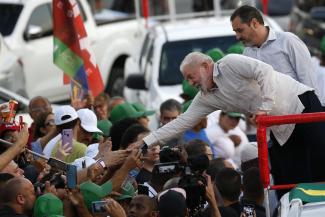Governance
A Lula victory could save Brazil’s democracy

The results of the elections in Brazil on 2 October can be considered a mixed blessing for both presidential contenders.
Luiz Inácio Lula da Silva, who previously served as head of state from 2003 to 2010, is the clear frontrunner, having won 6 million more votes than incumbent President Jair Bolsonaro. However, he had hoped to avoid the run-off by garnering more than 50 % of the vote. He missed that threshold by a mere 1,6 percentage points.
Bolsonaro, on the other hand, performed considerably better than opinion polls had predicted. He was only five percentage points behind Lula, not the double-digit figure that was expected. Nonetheless, he is the first incumbent to come out behind in a bid for presidential reelection in Brazil since democratization in the mid 1980s. Moreover, other candidates who took part in the first round have since endorsed Lula and only a small share of voters seems undecided.
As I argued before in this space (see my contribution on www.dandc.eu), a Bolsonaro victory would be bad news for the international community for environmental and political reasons. He has expressed pride in Amazon deforestation having accelerated under his rule, and he resents multilateral policymaking.
Brazil’s democracy at risk
At the domestic level the stakes are very high too. People have reason to worry about the future of Brazil’s democracy. Many had hoped Lula would win in the first round. Indeed, a landslide win would have made it much harder for Bolsonaro to claim electoral fraud. He has a pattern of following the example of Donald Trump, the former US president, and he is likely to mobilise radical right-wing supporters in an attempt to attack constitutional institutions in order to stay in power. Should Bolsonaro lose the run-off, however, dangerous political violence and turmoil are likely.
Should he win, however, he would most likely use his second term to dismantle democratic institutions in much the same way as autocratic leaders have done in Hungary, Turkey and Venezuela. The pattern includes rigging election systems in favour of the incumbent administration, limiting press freedom and undermining the authority of other branches of government.
Some Bolsonaro allies won influential position at sub-national levels earlier this month, and they would support such efforts. With a majority in Congress, he could change the constitution. The judiciary would certainly be targeted. Bolsonaro has already stated he wants to increase the number of justices from 11 to 15, obviously in order to appoint jurists who support him. Ultimately, he would control the top court, which so far has protected the rule of law and served as a bastion against administrative overreach in recent years.
Not everything is lost
Yet, not everything is lost. Lula has shown an impressive electoral resilience, even in a very uneven playing field. Bolsonaro managed to amend the constitution several times, allowing himself to spend more on subsidies and social benefits just before the votes were cast. Nonetheless, Lula’s lead is strong and very hard to overturn in only one month of election campaign. The polls still place him ahead.
However, Lula is less than a dream candidate for many Brazilian voters. His rejection rate is lower than Bolsonaro’s, but above 40 %. Bolsonaro’s strategy is to exploit the anti-Lula sentiment. There were indeed corruption scandals, including the buying of votes in Congress and the syphoning off of resources from government-owned companies, including the oil giant Petrobras.
Lula has even been convicted in several instances by the courts and served time in jail. However, the Supreme Court acquitted him on a legal technicality. However, there is also evidence of his trials being biased and politicised. Lula’s supporters claim he was unfairly treated by then judge Sérgio Moro and several prosecutors who are now known to be Bolsonaro supporters.
Key public figures in Brazil understand the historical significance of the run-off. They have put aside such resentments and endorsed Lula for the sake of protecting democracy. One example is Fernando Henrique Cardoso, another former president. Lula, in turn, has visibly moved from the left to the centre of the political spectrum, building a broad coalition that includes constituencies from the moderate and democratic right as well as conservatives. Running with him for the position of vice president is Geraldo Alckmin, a former governor of São Paulo state and Lula’s main opponent in the presidential elections of 2006.
A Lula victory would not mean the end of Bolsonarismo. But it could save Brazil’s democracy.
André de Mello e Souza is an economist at Ipea (Instituto de Pesquisa Econômica Aplicada), a federal think tank in Brazil.
andre.demelloesouza@alumni.stanford.edu
Twitter: @A_MelloeSouza







